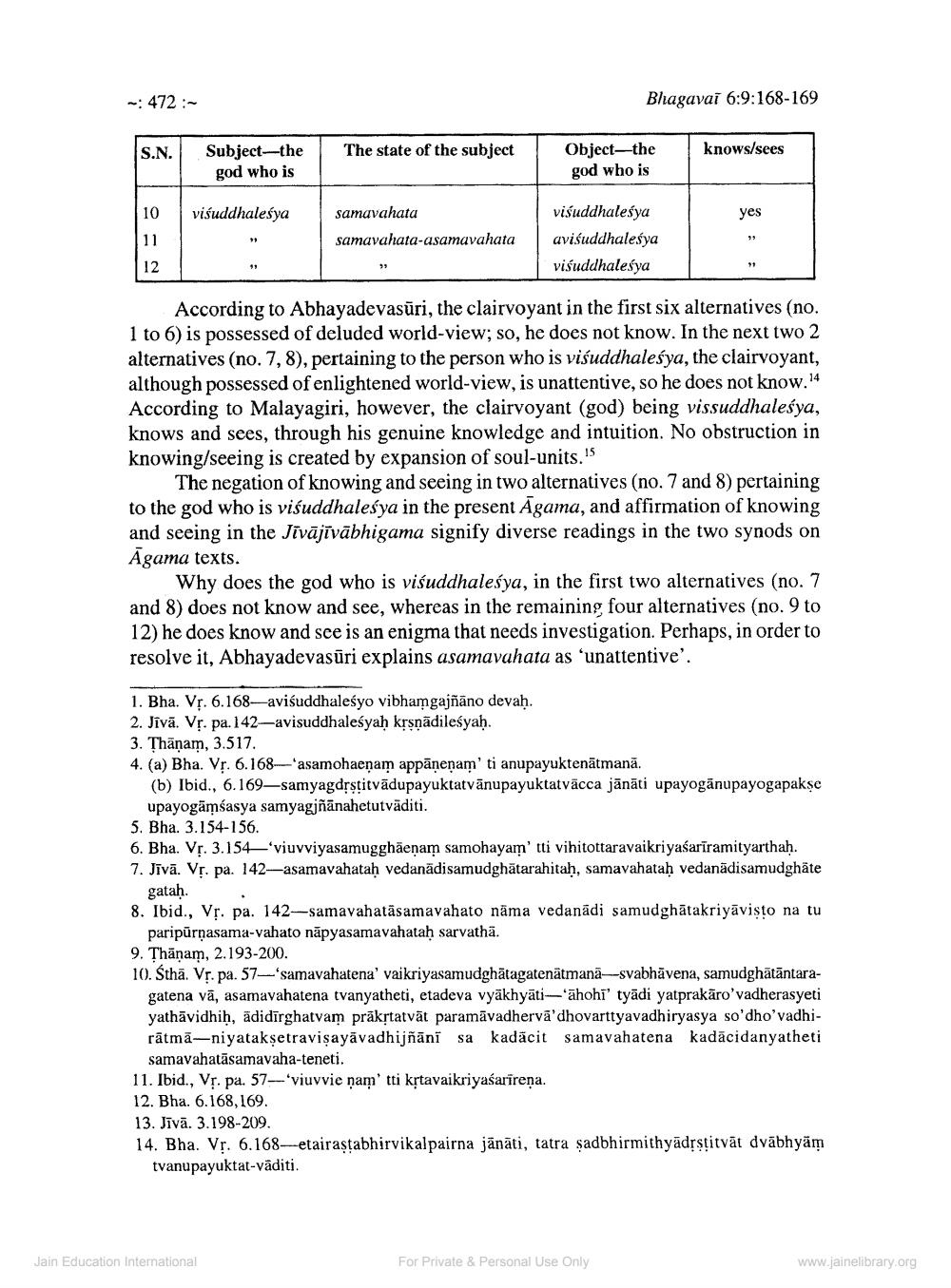________________
~: 472:~
S.N.
10
11
12
Subject-the god who is
viśuddhalesya
The state of the subject
samavahata
samavahata-asamavahata
Bhagavar 6:9:168-169
Object-the god who is
Jain Education International
visuddhaletya
aviSuddhalesya
visuddhalesya
samavahatāsamavaha-teneti.
11. Ibid., Vr. pa. 57-'viuvvie nam' tti kṛtavaikriyasarirena.
12. Bha. 6.168, 169.
knows/sees
According to Abhayadevasüri, the clairvoyant in the first six alternatives (no. 1 to 6) is possessed of deluded world-view; so, he does not know. In the next two 2 alternatives (no. 7, 8), pertaining to the person who is viśuddhalesya, the clairvoyant, although possessed of enlightened world-view, is unattentive, so he does not know.14 According to Malayagiri, however, the clairvoyant (god) being vissuddhalesya, knows and sees, through his genuine knowledge and intuition. No obstruction in knowing/seeing is created by expansion of soul-units.s
The negation of knowing and seeing in two alternatives (no. 7 and 8) pertaining to the god who is visuddhalesya in the present Agama, and affirmation of knowing and seeing in the Jivajivabhigama signify diverse readings in the two synods on Agama texts.
yes
Why does the god who is viśuddhalesya, in the first two alternatives (no. 7 and 8) does not know and see, whereas in the remaining four alternatives (no. 9 to 12) he does know and see is an enigma that needs investigation. Perhaps, in order to resolve it, Abhayadevasüri explains asamavahata as 'unattentive'.
55
1. Bha. Vr. 6.168-avišuddhalesyo vibhamgajñāno devaḥ.
2. Jīvā. Vṛ. pa. 142-avisuddhalesyaḥ kṛṣṇādilesyaḥ,
3. Thanam, 3.517.
4. (a) Bha. Vr. 6.168-asamohaenam appäneṇam' ti anupayuktenätmană.
(b) Ibid., 6.169-samyagdṛstitvädupayuktatvänupayuktatväcca jänāti upayogǎnupayogapakṣe upayogamśasya samyagjñānahetutväditi.
5. Bha. 3.154-156.
6. Bha. Vr. 3.154
viuvviyasamugghãäeṇam samohayam' tti vihitottaravaikriyasariramityarthaḥ.
7. Jīvā. Vṛ. pa. 142-asamavahataḥ vedanadisamudghātarahitaḥ, samavahataḥ vedanādisamudghāte gataḥ.
8. Ibid., Vr. pa. 142-samavahatasamavahato nāma vedanadi samudghatakriyāvisto na tu paripürṇasama vahato näpyasamavahatah sarvatha.
9. Thäṇam, 2.193-200.
10. Stha. Vr. pa. 57-samavahalena" vaikriyasamudghatagatenātmanā svabhāvena, samudghätäntaragatena vä, asamavahatena tvanyatheti, etadeva vyäkhyāti-āhohi" tyādi yatprakāro'vadherasyeti yathāvidhiḥ, adidirghatvam präkṛtatvät paramävadherva'dhovarttyavadhiryasya so'dho'vadhirātmā-niyatakṣetraviṣayāvadhijñānī sa kadācit samavahatena kadācidanyatheti
For Private & Personal Use Only
13. Jīvā. 3.198-209.
14. Bha. Vr. 6.168-etairastabhirvikalpairna jānāti, tatra sadbhirmithyadṛstitvät dvabhyam tvanupayuktat-vaditi.
www.jainelibrary.org




